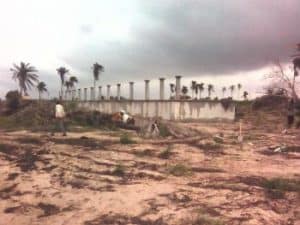 In creating a new poetry seminar recently, I chose the topic of epiphanies and, after exploring Google, I had a visceral reaction to an unfamiliar poem that emerged. That poem is “all because I loved you” by Olu Oguibe.
In creating a new poetry seminar recently, I chose the topic of epiphanies and, after exploring Google, I had a visceral reaction to an unfamiliar poem that emerged. That poem is “all because I loved you” by Olu Oguibe.
I read the poem, felt its powerful and sorrowful message, recognized the Christ imagery, and immediately knew I wanted to use the poem in the seminar, but I was not sure what the subject of the poem was. I emailed Dr. Oguibe, who is now a Professor of Art and African Studies at the University of Connecticut, and he replied, stating that the subject of the poem is Nigeria.
Although Dr. Oguibe was quite young when the Nigerian Civil War took place, he vividly remembers the tragic aftermath.
“all because i loved you” by Olu Oguibe
once i wrote with the irreverence of youth
and the fire of a heart burning to ash
i plucked words like faggots from blazing coal
and on the anvil of exile i hammered sorrow into verse
the burden of your suffering tore poetry from my flesh
and on the night of your hanging there was dust in my lines
i aimed for song and there was not an eye without tears
i marked the fourteen stations of the cross
but your death has killed my verse
each day i wake on the hour to mourn
and i feel like a wanderer in a city without lights
passion flees in the fog and words crumble at my touch
and my throat feels like a concrete floor
the power of tears has deserted me
i walk through the streets of this forbidding town
searching for faces i used to know
and your memory is like a faded picture in the pocket
here and there i hear your name like the distant crack of a whip
and there is a dull pain where the scars remain
i recall your stubbornness and the ring of blood on your wrist
and i embrace this cold that severed you from me
once i howled with the rage of a bard
there was epiphany in the pain
and all because i loved you
now i claw the walls for the naked word my lines are a hollow sepulchre
ready for the final dust
silence claims us at last
 With the aid of thought-provoking questions to guide their analysis, seminar attendees should be able to perceive the horrors of military dictatorship (heart burning to ash, whip, scars), the allusions to Christ (fourteen stations of the cross, blood on your wrist, sepulchre) the theme of exile that permeates Oguibe’s poetry (i feel like a wanderer in a city without lights), his use of irony (and i embrace this cold that severed you from me), and the lines that I believe foreshadow the fact that this poem would be his last (my lines are a hollow sepulchre/ready for the final dust /silence claims us at last).
With the aid of thought-provoking questions to guide their analysis, seminar attendees should be able to perceive the horrors of military dictatorship (heart burning to ash, whip, scars), the allusions to Christ (fourteen stations of the cross, blood on your wrist, sepulchre) the theme of exile that permeates Oguibe’s poetry (i feel like a wanderer in a city without lights), his use of irony (and i embrace this cold that severed you from me), and the lines that I believe foreshadow the fact that this poem would be his last (my lines are a hollow sepulchre/ready for the final dust /silence claims us at last).
The literary world was stunned and saddened when Dr. Oguibe decided to stop writing poetry and concentrate on his art, which is as powerful, sorrowful, and magnificent as his poems. He sparked an interest in African poetry, and I am now in contact with a young Kenyan poet who has a gift for writing beautiful, sorrowful, and powerful lines.
To learn more about Olu Oguibe, please visit either of the following websites: https://africa.si.edu/exhibits/olu.htm or https://plexus.org/oguibe/bio.html.

Recent Comments